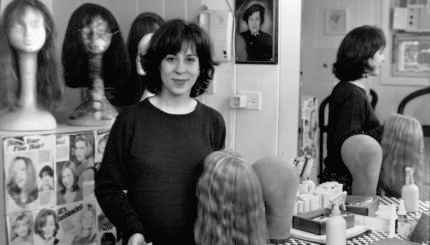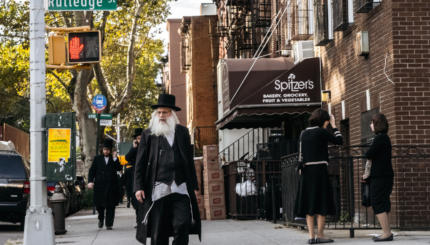Orthodox Judaism is the most religiously stringent of the three main streams of American Judaism.
Its adherents believe the Torah was given to the Jewish people in a mass revelation at Mount Sinai and that the rabbinical tradition (known as the Oral Law) is a faithful elucidation of divine rules for Jewish living that are obligatory upon all Jews today.
It is most prominently distinguished from more liberal approaches to Jewish practice by its adherence to gender-segregated prayer and its rejection of traveling on Shabbat.
Orthodox Judaism is more resistant than its liberal counterparts to the idea that biblical mandates can change in response to changing social circumstances.
Its adherents tend to live in concentrated geographic areas (nearly four out of five American Orthodox Jews live in the northeastern United States), owing to the inability to travel on Shabbat.
Orthodox Jews are vastly more likely than non-Orthodox Jews to enroll their children in private religious day schools (rather than public schools), to pray daily, and maintain traditional kosher dietary practices. Orthodox Jews are more than twice as likely as non-Orthodox Jews to say that being Jewish is very important to them, according to the 2013 Pew Research Center Survey of Jewish Americans.
Unlike Conservative and Reform Judaism, Orthodoxy is not a unified movement with a defined ideology and a universally respected authority. Rather, it is an umbrella term that covers multiple highly distinct subgroups, including Modern Orthodox, ultra-Orthodox (also known as haredi Orthodox) and Hasidic.
Orthodox Demographics
Approximately 10 percent of American Jews identify as Orthodox according to Pew — fewer than Reform and Conservative— however they tend on average to be younger and have larger families, which has led some to conclude that they will represent a growing share of the American Jewish community in the years to come. Approximately 21 percent of Israeli Jews are Orthodox, according to a 2016 Pew study, though non-Orthodox religious movements are less widespread in Israel than they are in the United States.
Though it is by far the smallest grouping within American Judaism, Orthodoxy is demographically strong. According to a 2015 Pew analysis, Orthodox Jews are younger on average than the broader Jewish community, with roughly a quarter between the ages of 18 and 29 (32 percent for ultra-Orthodox), compared to 17 percent of Reform Jews and 12 percent of Conservative Jews. They tend to have more children — 4.1 on average for Orthodox Jews between the ages of 40-59 compared to 1.7 for all Jews in that age range. And they have low attrition rates. According to Pew, 83 percent of Jews under 30 who were raised Orthodox are still Orthodox.
Orthodox History
The term Orthodox came to be applied to a more traditionalist attitude toward Jewish practice only in the 19th century, when more liberal approaches to Judaism emerged. The term itself came from Christianity, where it was used to describe faithfulness to the creeds of the early church. In the Jewish context, the term came into common use only in response to the introduction of Reform Judaism, which rejected the divine origins of the Torah and denied the obligatory nature of Jewish ritual observance.
Samson Raphael Hirsch, a leading 19th-century German Orthodox rabbi and one of the chief opponents of the emergent Reform movement at that time, wrote in 1854: “It was not ‘Orthodox’ Jews who introduced the word ‘orthodox’ into Jewish discussion. It was the modern ‘progressive’ Jews who first applied the name to ‘old,’ ‘backward’ Jews as a derogatory term. This name was … resented by ‘old’ Jews. And rightfully so.”
Eventually, the term came to be embraced by the traditionalists as an indication of faithfulness to customary religious practice. Today, a number of organizations self-identify as Orthodox, most prominently the Orthodox Union, which operates the largest kosher certifying agency in the world. Some Orthodox Jews prefer to describe themselves as followers of “Torah Judaism.”
Diversity Within Orthodoxy
Today, Orthodox Judaism encompasses a vast terrain of religious outlook and practice. Some 62 percent of American Orthodox Jews identify as ultra-Orthodox (haredi), a group whose adherents are typically marked by their distinctive black hats (for men) and scrupulously modest attire (for women). Ultra-Orthodox Jews are the most stringent in their commitment to Jewish law and tend to have the lowest levels of interaction with the wider non-Jewish society. They can be further subdivided into Hasidic Jews, heirs of the spiritual revivalist movement that began in Eastern Europe in the 18th century that emphasizes Jewish mysticism and communion with the divine, and Yeshivish (sometimes Litvish), which emphasizes the intellectual aspects of Jewish life, particularly rigorous Talmud study for men.
Roughly one-third of Orthodox Jews in the United States identify as Modern Orthodox, sometimes known as centrist Orthodoxy, which attempts to harmonize traditional observance of Jewish law with modern life and endorses secular academic studies. Open Orthodoxy, a small offshoot of Modern Orthodoxy, emerged in the 1990s in response to what was perceived as a growing stringency among Modern Orthodox Jews and a blurring of the lines separating it from ultra-Orthodoxy. Liberal Orthodox Jews have in recent years begun to push for expanded leadership roles for women, including the ordination of women as clergy. While Modern Orthodox institutions have supported enhanced religious training and leadership roles for women, the trend toward female Orthodox clergy remains marginal and has not been embraced by the mainstream institutions of American Orthodoxy.
Ashkenazi
Pronounced: AHSH-ken-AH-zee, Origin: Hebrew, Jews of Central and Eastern European origin.
Hasidic
Pronounced: khah-SID-ik, Origin: Hebrew, a stream within ultra-Orthodox Judaism that grew out of an 18th-century mystical revival movement.
Torah
Pronunced: TORE-uh, Origin: Hebrew, the Five Books of Moses.
kosher
Pronounced: KOH-sher, Origin: Hebrew, adhering to kashrut, the traditional Jewish dietary laws.
Talmud
Pronounced: TALL-mud, Origin: Hebrew, the set of teachings and commentaries on the Torah that form the basis for Jewish law. Comprised of the Mishnah and the Gemara, it contains the opinions of thousands of rabbis from different periods in Jewish history.



